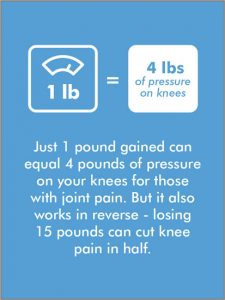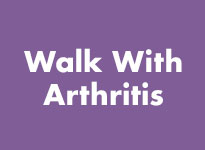Weight Management
A Doctor’s Advice
Earl’s story
A Daughter’s Story
The Weight & Osteoarthritis Connection
Did you know that your joint pain and your weight may be connected?
Osteoarthritis (OA) is the most common type of arthritis. OA can be caused by excess body weight, aging, a prior joint injury, being female, genetics, and excessive/repetitive movement from certain jobs or sports. For most people, OA can get worse over time if you don’t address the symptoms now.
Losing weight isn’t easy, but it could mean a world of difference for joint pain. Weight loss might help relieve some of the stiffness, swelling and pain in your joints from OA. Here are some tips to get you started.

Set a goal
Choose a weight loss goal you believe you can accomplish. Even small amounts of weight loss help: losing 1 pound can equal 4 pounds of pressure off your knees.

Take it slow
People who lose weight gradually and steadily (about 1 to 2 pounds per week) are more successful at keeping weight off. A goal of losing 10 pounds should take you 2 to 3 months or longer.

Focus on lifestyle changes
Healthy weight loss isn’t about quick fixes, extreme exercise, or fad diets. Your journey is extremely personal. Experiment to find the methods that work best for you and that you can stick with over time. Here are some websites that can help you adopt a healthier lifestyle:
- YOUR WEIGHT MATTERS – yourweightmatters.org
Take the Your Weight Matters Challenge today and talk to your healthcare provider about your weight. - CHOOSE MY PLATE – choosemyplate.gov
Learn about healthy eating, meal planning, and portion control. - FIND AN EXPERT – eatright.org/find-an-expert
Find a Registered Dietitian Nutritionist in your area who can help you develop a weight management plan.

Get your family or friends involved
Making healthy lifestyle changes is tough when you go it alone. Ask your family or friends to support and join you on your journey to a healthier weight.

Add exercise to diet
Most weight loss research finds that you probably won’t lose weight with exercise alone. The things you eat and the amount you eat have the most impact on how much you weigh. But for people with OA, adding exercise to your weekly routine can also help relieve joint pain. Try low-impact activities like walking to keep you moving and build more strength.

Stick with it
Don’t try to make too many changes at once. Pick just one thing you feel ready to focus on for the next few weeks. Then work on it for 6 to 8 weeks to make it stick.

Celebrate little wins
Give yourself a big pat on the back for every pound lost. Every pound you lose moves you closer to a life with less joint pain. Celebrate your successes with simple rewards like new music, an audiobook, a water bottle, new workout clothes or shoes, or even a phone call with your favorite person.
There is no cure for arthritis. However, joint pain and OA symptoms can be managed through various treatments, physical activity, lifestyle changes, and education. Visit oaaction.unc.edu/jointpain to learn about treatment and lifestyle changes that get you on the path to less joint pain.
Losing a Few Pounds Can Boost Your Overall Health:
> Better manage health conditions like diabetes and heart disease
> Improve your sleep
> Impact your self-confidence and mental health
> Reduce your chances of needing orthopedic surgery
> Stay more active and get back to favorite hobbies/activities
Take Steps to Learn More About OA
Weight Gain and Joint Pain
- Color Spread Version (PDF)
- Spanish Version (PDF)
- The Vicious Cycle of Obesity, Osteoarthritis (OA), and Disability
Can My Weight Make My Joint Pain Worse?
- The Vicious Cycle of Obesity, Osteoarthritis (OA), and Disability
- Color Spread Version (PDF)
- Spanish Version (PDF)
Resources from the Obesity Action Coalition:
- “Excess Weight and Your Health – A Guide to Effective, Healthy Weight Loss”– Guidebook and Video
- Obesity and Osteoarthritis Fact Sheet
- “Connecting Osteoarthritis and Obesity” – Kirsten Ambrose, MS, CCRC, Your Weight Matters Magazine, Summer 2016
- “The Wear and Tear of Obesity: the Burden of Weight in Joint Disease” – Jacqueline Jacques, ND; OAC website- Educational Resources>Resource Articles>Obesity-related Diseases
- How Obesity Affects Arthritis – Leni Ellen Kramer, MD, FACR; OAC website- Educational Resources>Resource Articles>Obesity-related Diseases
- Are you getting enough Vitamin D? – Marie A. Spano, MS, RD, CSCS, CSSD; OAC website- Educational Resources>Resource Articles>Nutrition
- Walk into Weight Loss and Health – Mira Rasmussen, BS, ACSM-HFS; OAC website- Educational Resources>Resource Articles>Exercise
- National Obesity Care Week Resources for Patients
Resources from the Centers for Disease Control and Prevention
- How to avoid portion size pitfalls to help manage your weight
- Rethink your drink
- Eat More, Weigh Less: How to manage your weight without being hungry
- How to use fruits and vegetables to manage your weight
Provider Resources
Guidelines and Policy Resources
- Role of Body Weight in Osteoarthritis – Johns Hopkins Arthritis Center

- Dietary Guidelines for Americans 2020
- Surgeon General’s Call to Action
- A National Public Health Agenda for Osteoarthritis
- Statements on CMS decision concerning coverage for intensive behavioral counseling for obesity
- SHAPE America Guidelines
Academic and Clinical Resources
- Continuing Medical Education course for healthcare providers: Exercise Prescription for Osteoarthritis and Weight Management. Learn about strategies and resources to help your patients with osteoarthritis pursue physical activity safely and effectively. This activity has been approved for AMA PRA Category 1 Credit™.
- Weight Management 30-minute webinars with leading researchers and experts
- Harvard’s Implicit Association Tests (IAT) where you can test yourself for different types of bias (ex. race, weight)
- Weight loss reduces knee‐joint loads in overweight and obese older adults with knee osteoarthritis
- Framingham Studies
- What if We Prevent Obesity? Risk Reduction in Knee Osteoarthritis
- Weight Loss and Obesity in the Treatment and Prevention of Osteoarthritis
- Disability, Arthritis, and Body Weight among Adults 45 Years and Older
- NCHS Data Brief on Obesity: Prevalence of Obesity in the United States, 2009–2010
- Weight Loss Messages in Knee OA: Attention-grabbing, Credible, Non-motivating
Explore More
The information provided on this website is for educational purposes only. Always consult your doctor before starting any new treatments or if you have any questions about your current treatment.











